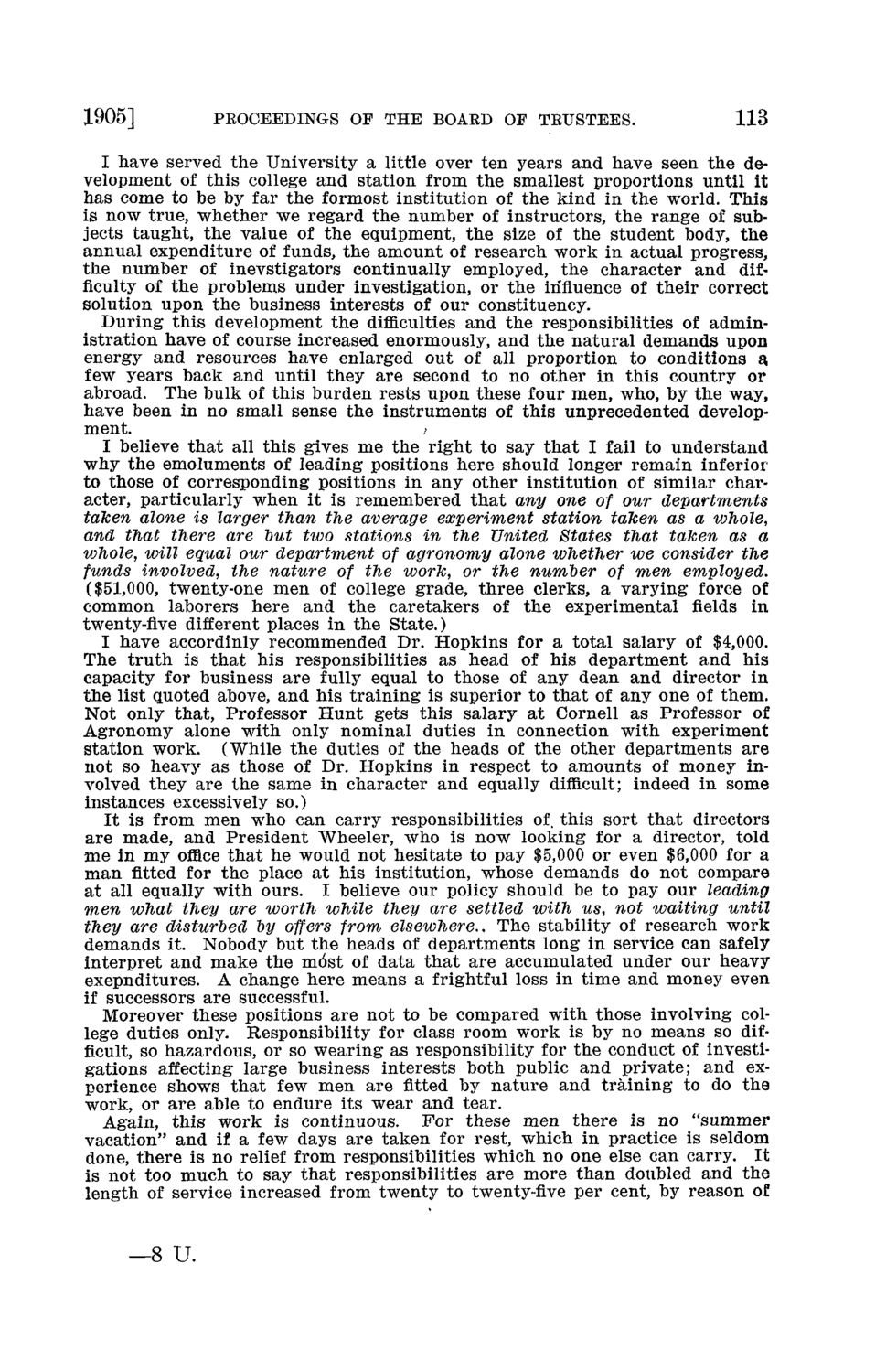| |
| |
Caption: Board of Trustees Minutes - 1906
This is a reduced-resolution page image for fast online browsing.

EXTRACTED TEXT FROM PAGE:
1905] PEOCEEDINGS OF THE BOAED OF TEUSTEES. 113 I have served the University a little over ten years and have seen the development of this college and station from the smallest proportions until it has come to be by far the formost institution of the kind in the world. This is now true, whether we regard the number of instructors, the range of subjects taught, the value of the equipment, the size of the student body, the annual expenditure of funds, the amount of research work in actual progress, the number of inevstigators continually employed, the character and difficulty of the problems under investigation, or the influence of their correct solution upon the business interests of our constituency. During this development the difficulties and the responsibilities of administration have of course increased enormously, and the natural demands upon energy and resources have enlarged out of all proportion to conditions a few years back and until they are second to no other in this country or abroad. The bulk of this burden rests upon these four men, who, by the way, have been in no small sense the instruments of this unprecedented development. f I believe that all this gives me the right to say that I fail to understand why the emoluments of leading positions here should longer remain inferior to those of corresponding positions in any other institution of similar character, particularly when it is remembered that any one of our departments taken alone is larger than the average experiment station taken as a whole, and that there are but Uoo stations in the United States that taken as a whole, will equal our department of agronomy alone whether we consider the funds involved, the nature of the work, or the number of men employed. ($51,000, twenty-one men of college grade, three clerks, a varying force of common laborers here and the caretakers of the experimental fields in twenty-five different places in the State.) I have accordinly recommended Dr. Hopkins for a total salary of $4,000. The truth is that his responsibilities as head of his department and his capacity for business are fully equal to those of any dean and director in the list quoted above, and his training is superior to that of any one of them. Not only that, Professor Hunt gets this salary at Cornell as Professor of Agronomy alone with only nominal duties in connection with experiment station work. (While the duties of the heads of the other departments are not so heavy as those of Dr. Hopkins in respect to amounts of money involved they are the same in character and equally difficult; indeed in some instances excessively so.) It is from men who can carry responsibilities of, this sort that directors are made, and President "Wheeler, who is now looking for a director, told me in my office that he would not hesitate to pay $5,000 or even $6,000 for a man fitted for the place at his institution, whose demands do not compare at all equally with ours. I believe our policy should be to pay our leading men what they are worth while they are settled with us, not waiting until they are disturbed by offers from elsewhere.. The stability of research work demands it. Nobody but the heads of departments long in service can safely interpret and make the m6st of data that are accumulated under our heavy exepnditures. A change here means a frightful loss in time and money even if successors are successful. Moreover these positions are not to be compared with those involving college duties only. Responsibility for class room work is by no means so difficult, so hazardous, or so wearing as responsibility for the conduct of investigations affecting large business interests both public and private; and experience shows that few men are fitted by nature and training to do the work, or are able to endure its wear and tear. Again, this work is continuous. For these men there is no "summer vacation" and if a few days are taken for rest, which in practice is seldom done, there is no relief from responsibilities which no one else can carry. It is not too much to say that responsibilities are more than doubled and the length of service increased from twenty to twenty-five per cent, by reason of —8 U.
| |